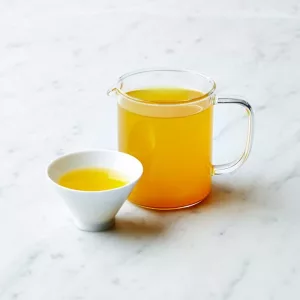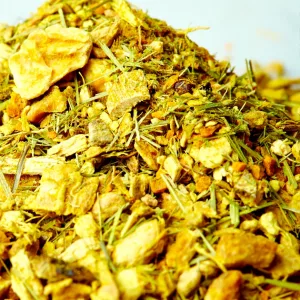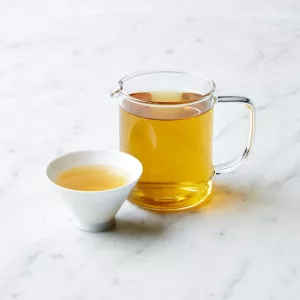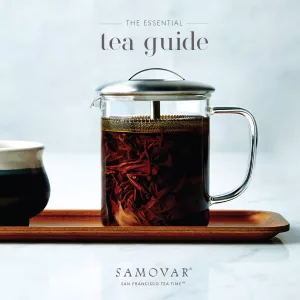 By Brian X. Chen April 02, 2009 | 1:42:05 Pm
By Brian X. Chen April 02, 2009 | 1:42:05 Pm
The drink of choice for Web 2.0 zillionaires isn’t a quad espresso anymore. It’s a soothingly steeped tea harvested from a shaded mountainside half a world away.
Captains of the internet like Digg’s Kevin Rose and business guru Tim Ferriss (pictured above) are gravitating to the ancient drink, and enterprising retailers are stepping up to fill their every need.
“We’ve had the Red Bulls, coffee and everything else,” Rose says of Digg, which spends about $1,000 a month just on specialty tea for employees. Rose himself favors a cup of Pu-erh imported from China’s Yunnan province after a tough day at the office.
“It’s one of those things where you want to turn to something really natural and from the Earth — and from something that isn’t going to give you a big crash,” Rose told Wired.com. “Once you start consuming tea it makes sense: This is the best of all worlds.”
In Silicon Valley, specialty tea is quickly becoming a phenomenon. Specialty shops, stores and tearooms devoted to the leaf are sprouting up all over the Bay Area. In San Francisco, tea businesses have gone beyond Chinatown and Japantown, spreading to Hayes Valley, the Castro and SOMA.
Tea is the new coffee — the tipple of choice for the Twitteratti. The culture that brought us pizza as a food group and $20,000 coffeemakers has now discovered tea. And its internet-savvy boosters like Rose and Ferriss are leading a movement in the United States to promote the leafy beverage as a trendy drink for new-age geeks who are as obsessed with having energetic bodies as they are with fast computers.
“It’s the new social lubricant,” said Jesse Jacobs, owner of Samovar Tea Lounge, a popular mini-chain of high-end tea rooms in San Francisco. “You’re never hung over and you can never drink too much.”
Rose, Ferriss and Jacobs are hoping to see specialty tea hit the mainstream just like coffee. And it’s certainly possible: Many credit Alfred Peet for single-handedly spearheading the specialty-coffee movement when he opened the first Peet’s Coffee & Tea store in Berkeley in 1966. Starbucks soon followed, and today their coffee shops are omnipresent.
Tea is so ancient that its exact origins are impossible to trace. In one popular Chinese legend, emperor Shen Nung, who drank only boiling water for hygienic precaution, discovered tea by accident 5,000 years ago. According to the tale, some dry leaves fell from a bush into the emperor’s boiling water, and the first cup of tea was created.
Today, fine teas are taking their place in the center of the digital universe. Specialty shops like the Samovar Tea Lounge are virtual emporiums of the beverage, carrying teas from cities, villages and gardens all over the world for guys like Rose and Ferriss, who use it to find respite from their endlessly busy, overly connected lives.
Jacobs, owner of Samovar, which opened three locations in the past year, explained that technology and the internet have changed everything for the tea industry.
“Technology, commerce, shipping methods, storing methods — all these things come together so that today we have access to the best tea ever,” Jacobs said, who has a background in technology himself as a former user interface designer.
He added that the emergence of social networks like Facebook and Twitter are bringing exquisite, obscure teas to the tech-driven world.
Digg founder Rose, for example, who is hailed as one of the most influential people on the web, is playing a large role in bringing obscure teas to the mainstream. He said he quit drinking soda as a New Year’s resolution in 2000, and he turned over a new leaf for tea.
Rose often tweets about new teas he’s trying out to his nearly 400,000 Twitter followers and even created a separate Twitter account — @goodtea — devoted to tea. He also started a Facebook page about the ancient beverage, where he posts videos and information. To top it off, Rose links to Samovar Lounge’s web site on his personal blog, and he plans to make videos with Jacobs showing geeks how to brew loose tea.
Another active member of the tea resurgence is Ferriss, the owner of a supplements company who became a Silicon Valley star with his bestselling book The 4-Hour Workweek: Escape 9-5, Live Anywhere, and Join the New Rich.
In the book, Ferriss plays the role of motivator-in-chief, instructing businesses to adhere to one rule of thumb: Cut out all excess information, such as e-mail, Twitter, Flickr and so on. And when something crops up that could potentially stifle productivity, such as a work crisis, hire someone else to deal with it.
So it comes as no surprise that Ferriss, a man who preaches paying more while dealing with less, prefers tea over coffee. He doesn’t want the jitters, the increased anxiety or the bouncy high. He just wants the energy. And he admits that being a tea connoisseur requires spending a bit more than the stuff you’d get in bags. At Samovar, patrons spend anywhere from $10 to $50 each to enjoy a small cup of exquisite tea — such as Mu Za Tie Quan Yin, if they’re feeling extra fancy, which runs for $140 per ounce.
“Tea shots of gyokuro for $50 a thimble full?” Ferriss used as an example. “It ain’t cheap, and it’s certainly not for everyone, but that’s the key: It’s affordably indulgent. A way to show off your insider knowledge instead of distasteful displays of wealth, much of which has been lost.”
How long will it be until you can stroll down a block just about anywhere, sit down and enjoy a cup of Ryokucha imported straight from Japan? Rose is optimistic that the tea renaissance is just five years away.
“There’s a reason tea has been popular for thousands of years,” Rose said. “I have a feeling we’re getting closer and closer to the tipping point.”
Media Contact:
Jesse Cutler, Samovar: (415) 655-3431 / publicity@jpcutlermedia.com





